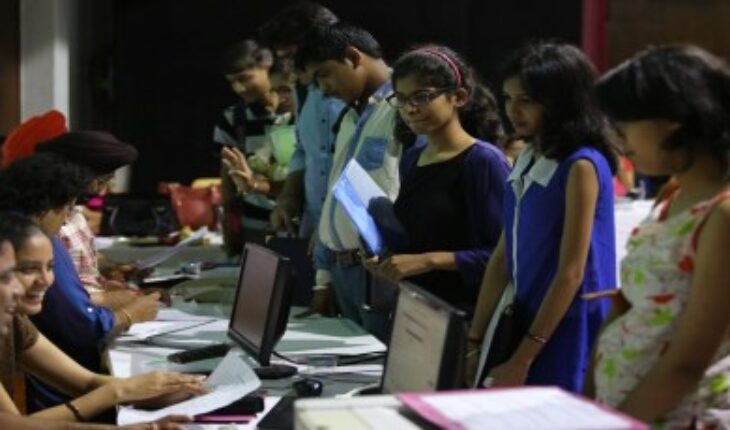
The year 2024 has proven to be a formidable challenge for placements at some of India’s premier engineering colleges and elite business schools. The global economic slowdown, over-hiring in the aftermath of the post-pandemic job boom, and a significant reduction in campus hiring have collectively left the class of 2024 in a state of uncertainty, with hearts pounding and butterflies fluttering in their stomachs. Despite India’s impressive economic growth figures, there’s an imminent job crisis at the grassroots level.
In the preceding year, India witnessed the dismissal of 36,000 tech employees, and Edtech giant Byju’s laid off over 10,000 people in just two years. Even the once-thriving domain of Indian startups experienced a five-year low in funding in 2023, with a staggering 73% drop in capital injection from $25 billion to $7 billion. This downturn directly translated into increased layoffs and a severe clampdown on hiring in the Indian startup ecosystem.
Compounding these challenges are emerging geopolitical tensions and global conflicts, further worsening macroeconomic conditions. Investors, even in buoyant markets, have become apprehensive, leading to a tightfisted approach. Ironically, amid these challenges, India continues to surge forward as one of the world’s fastest-growing economies. However, the paradox lies in the lack of employment opportunities, particularly for the youth in urban India where most development is concentrated.
According to the Centre for Monitoring Indian Economy, the country’s unemployment rate reached its highest point in the last two years, peaking at 10.5% in October 2023 from 7.5% in September 2023. It’s evident that India’s economic expansion is failing to create sufficient employment opportunities for a significant portion of its population.
Major IT firms such as Infosys and Wipro have already announced a pause in campus recruitments and hiring of fresh college graduates last year, a trend expected to persist this year. This unfortunate reality translates into heartbreak for millions of freshly graduated engineering students, as many other corporate firms follow suit with similar halts in campus hiring for freshers.
Adding to the chaos, Mercer Mettll’s India’s Graduate Skill Index 2023 report suggests that only 45% of Indian graduates who apply for jobs are employable according to the latest industry demands and standards. This means tens of millions of Indian graduates are automatically excluded or disqualified from the scarce pool of jobs available in urban India.
So, why is India’s seemingly fairy-tale growth story, with its vast number of skilled graduates, coupled with the specter of layoffs and recruitment freezes, not adding up? Beyond major macroeconomic factors such as recessionary fears, a weak pipeline of deals, and global economic slowdown, there’s a fundamental issue: the wide gap between acquired knowledge in classrooms and the skills required in various industries and corporate sectors.

The memory-based education system in India, heavily emphasizing theoretical and rote learning, is producing academic champions but failing to create realistic plug-and-play heroes capable of meeting employer expectations and swiftly adapting to rapidly changing economic scenarios. This stark mismatch between academic institutions’ output and the job sector’s requirements is evident.
Graduate engineers and MBAs with near-perfect scores often shy away from personal interviews and become nervous at the mere mention of a recruiter contacting them. The lack of communication and interpersonal skills, along with the absence of emotional intelligence and the inability to create friendly interactions without ulterior motives, renders many self-centered, high-ranking academic toppers unfit for selection in large organizations seeking a decent ‘company culture’ fit rather than just high technical skills.
The logic is clear – beyond a certain basic level, advanced skills can be imparted to any trained mind. However, people skills such as cooperation, collaboration, teamwork, active listening, and empathy are more reflective of a person’s conduct and longevity at work. In times like these, when recruiters are becoming tougher to please and layoffs are becoming a trend, it’s imperative for the class of 2024 to judiciously blend their hard and soft skills.
At the university where I teach, we’re addressing this challenge with our 20,000 students. Engineers, architects, MBAs, pharmacists, computer scientists, and Artificial Intelligence graduates are all being trained to strike a meaningful human chord with everyone by honing their people skills. The goal is not only to create a workforce that is ‘Work Ready World Ready’ but also to cultivate a new breed of humane professionals perfectly aligned with the industry and its testing times.
As one of the engineering freshers who secured a high-paying job remarked, “I enrolled for an A-grade engineering course, but it was the inner engineering that came along with it which made me win.”
Sourav Roy is a Professor of Practice at Chitkara University





